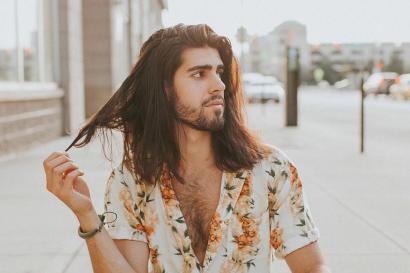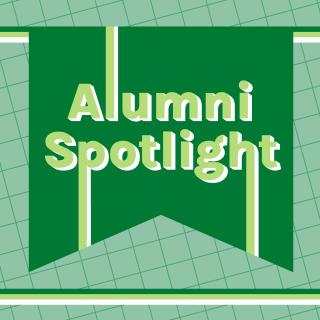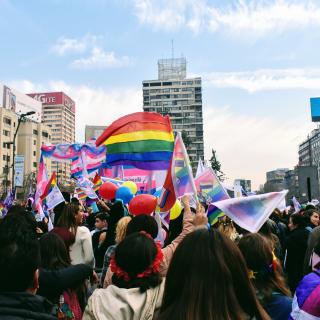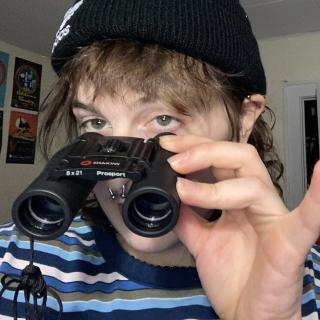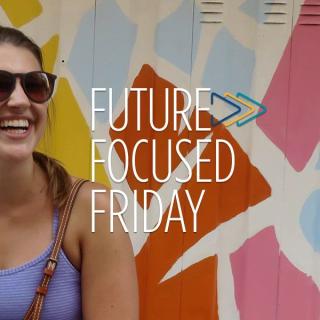Before studying abroad in South Africa, John Luke Hawkins (IES Abroad Cape Town – University of Cape Town, Fall 2016 | Hope College) admits he wasn’t very aware of the country’s history or current social climate. Orientation gave him a foundational understanding, and engaging with the local community expanded his knowledge.
Despite not having classes for a month due to protests, John Luke, a Global Citizen of the Year Finalist, sought out an education through speaking with student protesters, reading articles, and following social media. Ultimately, he used what he learned to act as an ally of the movement for free decolonized education in South Africa.
John Luke returned to the United States motivated to continue working towards social justice, first at his home university in Michigan, and later in South Dakota, New York, and now Washington. We chatted with John Luke to hear more about how studying abroad spurred, what he described as, a “180 degree turn” in his life.
IES Abroad: The theme of the 2018 Global Citizen of the Year application is all about finding your place in the world. How did studying abroad help you find yours?
John Luke Hawkins (JLH): My study abroad experience played an integral part of me finding my place in the world, mainly because I found who I was. I really built up my identity through studying abroad. I would say, I was always someone who was passionate about helping others, but I realized through studying abroad that there were times I was helping others that was actually more hurtful. So studying abroad opened my eyes and gave me a much more awareness of injustice and what that looks like, especially in a racial sense.
Also, being able to learn through a sociology class –Race, Class Gender and Sexuality– I took while I was there, really helped me put terms to many concepts I had experienced but didn’t necessarily know the words for.
All that to say, study abroad gave me a big fire for social justice and to really pursue that in my life. I would say, prior to that, social justice was something I was passionate about, but it wasn’t my beating drum.
On a different level, and this wasn’t a piece I touched on in my Global Citizen of the Year personal statement, but when I studied abroad, it also challenged my sexuality. I went into study abroad thinking I was a straight male, but I left knowing that I was a gay male. That also was a huge identity change, and was a really big piece of me finding my place in the world. It helped shape me, and it caused a lot of liberation and gave me spaces to function in a way that I hadn’t been allowing myself before.
That’s a very long story, but to give you a five second version: For twenty-one years there was a lot of internalized homophobia and sexual oppression that really just didn’t allow me to ask the question if I was gay. Studying abroad, being in a new space, allowed me to do that.
Finding my place in this world, I would say that kind of came in two different ways. It came in finding my own identity, as well as understanding the world more and what I wanted my place to be in the world… In terms of the impact of study abroad, I often refer to myself as pre-Cape Town John Luke and post-Cape Town John Luke, so it was very impactful.
“I went into study abroad thinking I was a straight male, but I left knowing that I was a gay male. That also was a huge identity change, and was a really big piece of me finding my place in the world.”
IES Abroad: Was making a difference something that you set out to do during your time abroad? Or did it unfold while you were there?
JLH: In general, I don’t like the concept of going into a place that is not my home with the mindset that I’m going to make a difference, so I wouldn’t say that was my mindset. I really tried to come into the situation without a lot of expectations and with an open mind and just see where that took me.
I wouldn’t even say, necessarily, that I made a difference while I was there. I would say that Cape Town made a difference on me, and because of that, I became a part of these protests that were happening or different social justice movements.
At the end of the day, it was the students that really made that difference, and I had the opportunity to be a part of that. I tried to go in with the concept of “I’m a guest” and “how can I learn from this” not “can I make a difference in this place that I don’t necessarily know.”
When I went into study abroad, all I really knew was that I wanted to go to the continent of Africa. The options were Cape Town, and I think here was maybe one other option through what my school had, but that’s kind of how I did my deciding process.
I was not very aware at all honestly [of the different racial and social issues in Cape Town]. The knowledge that I had came mostly through some of the pre-reading materials from IES Abroad before I left. Orientation…was a time where I felt like I was really a sponge and just trying to soak in the knowledge of what South Africa was, and that was a helpful time.
[I learned more] through speaking with students and getting to see firsthand some of the effects of the history of Apartheid or just any of the racial tensions that still exists. All in all, [the history and social dynamics in Cape Town] were not something that I was aware of, so that’s definitely why I couldn’t go in with the concept that I was going to make a difference because for a big part of it I just didn’t know what to expect.
IES Abroad: Something we loved about your activism was that you strove to be the best ally possible to the communities and the movements you supported in Cape Town. What advice would you give to other IES Abroad students on how to be an ally abroad?
JLH: I think some of the biggest things to keep in the forefront of your mind is that you are a guest in a culture, so you need to act appropriately as a guest. In being a guest, I think it’s really important to understand your privilege. For me, for example, with my specific situation in Cape Town, I understood that these protests really at the end of the day weren’t going to affect my life. In three months I was going to fly home and continue to a life like I normally had…
To be an ally, to be part of a movement, you really need to understand the history of the movement, as well as the history of the context of where you’re at. It was really important for me to understand that and not just jump into something and not actually realize what I was supporting…
Also, with being an ally, [you have to recognize] what that means. With being an ally, it means that there has to become a sense of sacrifice. I think it’s important to remember, like for me, I’m not doing this protest for an Instagram picture, or to just feel good about myself. But there’s a piece that I am saying I am willing to sacrifice, so like, I wasn’t sure that I was going to get credits that semester, and thankfully I did. But, what I had to [do was] sit down and say “okay, am I willing to not get credits for this semester and maybe have to figure out something once I go back home?” I eventually decided, yes, because you have to look at the bigger picture.
Part of this movement was bringing racial equity into South Africa. That was something I supported fully. If that meant I had to somehow give up a semester or maybe do a compromise, then I was willing to put that on the table. I think that’s also a piece of advice, just how to be an ally is also understanding that there is a piece of sacrifice and deciding if that is worth it to you.
“To be an ally, to be part of a movement, you really need to understand the history of the movement, as well as the history of the context of where you’re at.”
IES Abroad: You mentioned that your activism in South Africa wasn’t a “one-and-done type of situation.” How have you continued to act as a global citizen and fight for social justice since returning home?
JLH: I think that can come into a lot of different contexts, so I’ll just try to give a few examples.
When I got back from study abroad, it was my senior year, and I had one semester left. I took on a new role on our campus as the interfaith ambassador. [My goal was to help] break down religious bigotry as well as promote interfaith – inclusion of all faiths on our campus. We were on a predominantly Christian campus, and this was post-election, so I felt like that was an important cause to take on. That was one of the big things I focused on – putting on interfaith events and doing research.
[In this role, I] did research exploring if interfaith had a place on Hope College’s campus through looking at the variables of someone’s faith or philosophical background in correlation to their sense of value and self-worth. I ended up writing a 20-page research paper through a few different focus groups and then publishing that. Through that I was able to put kind of the ground work for people to continue the interfaith movement on campus because they had the base of if interfaith belongs on our campus, and we concluded that it did.
After that, I moved to South Dakota to Black Hills State University, and I worked as the Student Engagement and Programming Assistant. I worked with a leadership series and did programming and an international service-learning trip to South Africa and Botswana. I was the logistics coordinator for that.
That job allowed different pieces of social justice to seep through and I would say that what I’m about to do has a more tangible piece of social justice as well. I’m moving to Seattle to work in an AmeriCorps position as a College Access Now Coach for underrepresented populations, and so that piece is something that continues in my work in social justice.
I would say as a whole, social justice is a drumbeat that I march to. The conversations that I have often revolve around concepts of: “Are people being included? Is everyone’s voice being heard and valued? And what are we doing to promote equity?”
Those are conversations that I have and try to involve myself with as well as just how I try to treat people every day. I try to be very conscientious of the words that come out of my mouth. I kind of go back to those questions and see if [my words] are corresponding to that.
IES Abroad: What’s next for you?
JLH: I would say my professional goals and career path have been shaped because of my Cape Town experience. I’m really putting that new worldview into play. I moved to South Dakota, kind of on a whim, but I also felt ready for it because I studied abroad. I just felt like, “Oh, I don’t know quite what I’m doing, but I’m just moving across the country.” But then I was like, “Well, I’ve kind of done this before, so I guess I’m ready.” That job was just a nine-month contract.
This summer, I’m at the School of American Ballet, I’m kind of an RA meets summer counselor in New York. This New York job was just on the whim as well, and then the Seattle job kind of fell into place that way as well. Having a continuous sense of adventure is a professional goal [for me], as well as a [seeking a ] continuous sense of growth wherever I can go.
One of my mottos is always to be the best version of myself. [By] giving myself opportunities to grow and challenge myself, I can continue to be a better person.
I think also, growing out of my study abroad experience, I like to consider that time as a stretch in my life. A stretch meaning that I was pulled in a certain direction that helped challenge and grow me, but I also had the space to reflect and journal and process what was happening. I realized that I wanted to seek that out again, so that’s why I’m going to Seattle and doing this AmeriCorps position.
Some of the ways that I know I’ll be challenged is that it’s a very low-income position. I’ll have to be forced into living more simply, which is something that I think I need to work on just in terms of like, “no more stress shopping for me.” Or even just other things that I really enjoy, like fashion but with this job you are given a uniform and while that seems miniscule, that will be a challenge for me. In these opportunities [I hope] to continue to grow, to see worlds from new perspectives, and to grow into the person I am hoping to be.
Long term goal, I’m planning on going to Seattle University and getting a masters in Student Development and Administration because I want to work in higher education, specifically in a multi-cultural center or a diversity and inclusion center. However, I’m actually choosing to defer and just do the AmeriCorps position this year, and then maybe going the next year to that school.
IES Abroad: In your own words, why should future study abroad students care about the world?
JLH: I think we’re all just little specks on this world, but a little speck can make a really big impact. That impact can be positive or negative, so I think it’s really important that we try to be one of the positive impacts. To do that it’s really important that we’re global citizens of this world to have a full understanding of how this world functions on a global level and have different perspectives.
